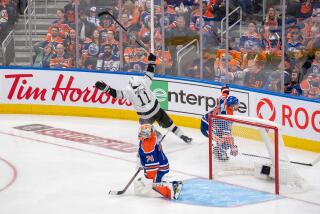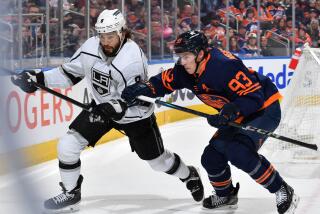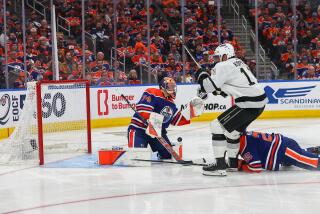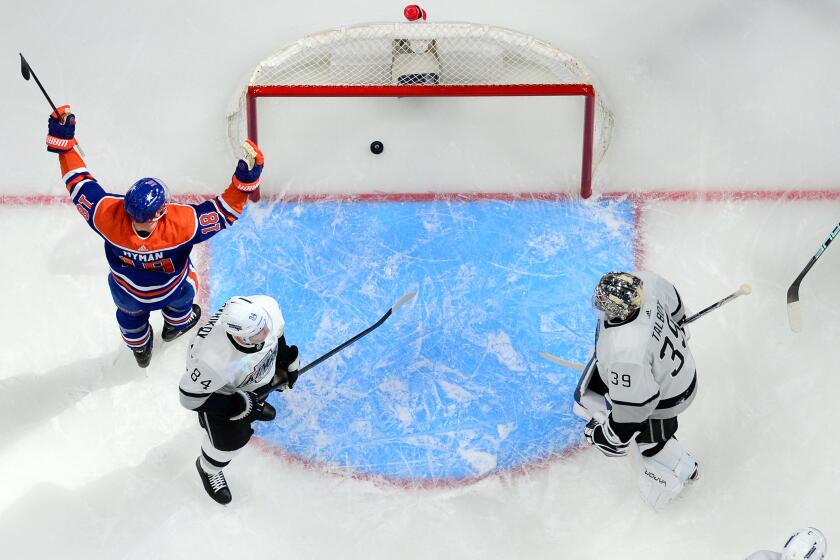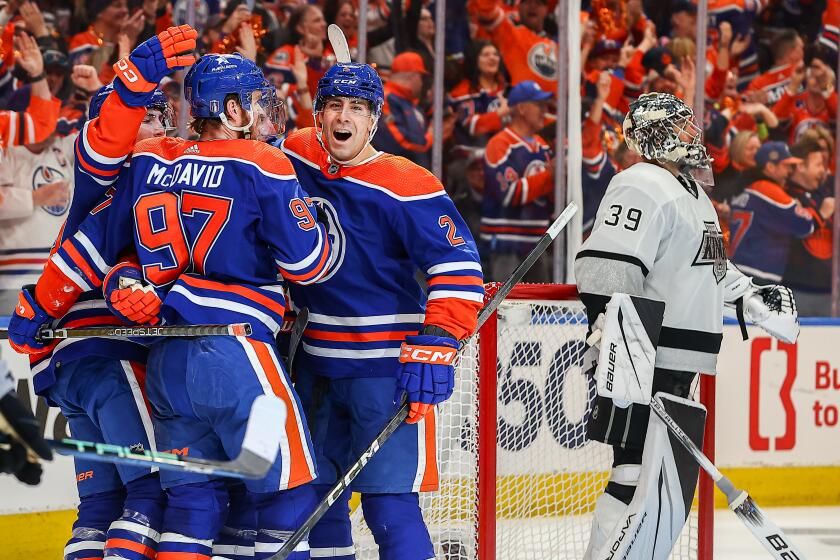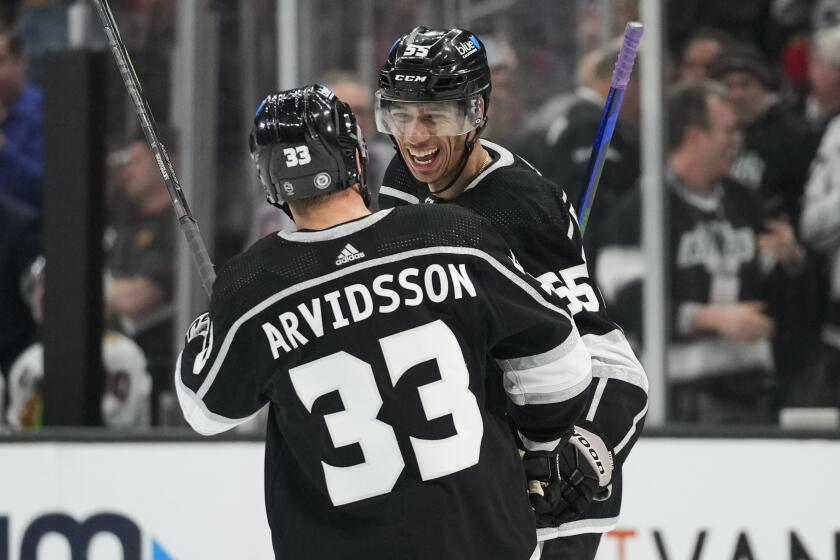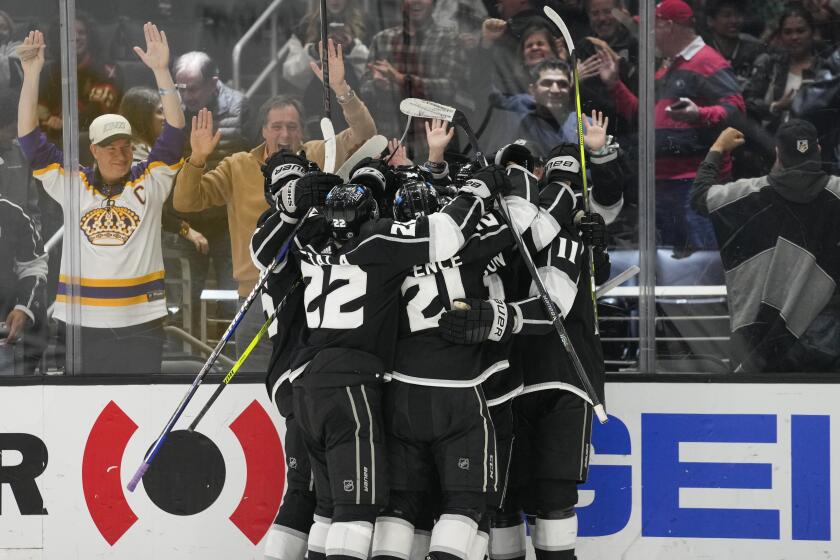Wings, NHL having their way
When is a supposedly automatic suspension not automatic or a suspension?
When the NHL is involved and it’s an act committed by a marquee player whose absence from Game 3 of the Stanley Cup finals might have pushed the league’s showcase event further toward a rout that would have cut the already minuscule TV ratings.
This time of year the games should be paramount, and the Detroit Red Wings have been remarkable. Their second successive 3-1 victory over the Pittsburgh Penguins at Joe Louis Arena gave them a prohibitive 2-0 lead as the finals shift to Pittsburgh for Games 3 and 4 Tuesday and Thursday.
They were better Sunday from A to Z -- from fourth-liner Justin Abdelkader, who scored in his second straight game, to magnificent Henrik Zetterberg, who again helped negate the many talents of Sidney Crosby.
But the NHL’s twisted logic became the story.
Regular-season scoring champion Evgeni Malkin, driven by frustration to instigate a fight with Zetterberg with 19 seconds left in the third period, narrowly escaped a one-game banishment when the league’s director of hockey operations, Colin Campbell, rescinded the one-game suspension he deserved.
Campbell’s reasoning was intriguing.
In a statement released by the league he said suspensions are applied under rule 47.22 “when a team attempts to send a message in the last five minutes by having a player instigate a fight. A suspension could also be applied when a player seeks retribution for a prior incident. Neither was the case here and therefore the one-game suspension is rescinded.”
It’s good that he can read minds and know Malkin’s intent. Before Campbell’s statement Penguins Coach Dan Bylsma said he thought “there are rules that are clear,” and that he’d have to do without Malkin on Tuesday.
It might not matter that Malkin will be available, so determined have the Red Wings been to overcome every obstacle stacked in their path.
Despite being one of the oldest teams in the NHL, they’ve played the first two games of the finals on back-to-back nights -- a decision made to satisfy the TV gods -- and seem hardly the worse for wear.
Jonathan Ericsson, who had his appendix removed Wednesday, played Saturday and Sunday and was a force both nights, scoring Detroit’s tying goal Sunday.
Of the 32 times a home team has swept the first two games of the finals, that team has won the Cup 31 times. The exception was the 1971 Chicago Blackhawks, who won the first two games at home but lost to the Montreal Canadiens in seven games.
The Red Wings don’t appear likely to be another exception.
“They’re a good team. They’ve shown that for the last 10, 12 years, whatever it may be,” said Penguins winger Chris Kunitz, a member of the 2007 Ducks team that beat the Red Wings in the West finals.
“It’s experience. They play a great puck-possession game. They control the puck and the lead and they know what to do. We’ve got to elevate our game a little more, and that’s what we’re planning on doing.”
A “little more” won’t be enough.
The Penguins got to the net more frequently Sunday and Crosby and Bill Guerin each rang shots off the post, but near-misses don’t count for much in the final analysis.
“In each of the first two games we have been able to play in the offensive zone for periods of time,” Bylsma said. “We’ve been able to get shots, been able to outshoot a good Detroit team. But they’ve been able to get the timely goals.”
And get energy from players like Abdelkader, a native of Muskegon, Mich., who was still deciding what kind of plaque to get to display his first Stanley Cup goal when he scored his second, at 2:47 of the third period, a knuckler that beat Marc-Andre Fleury.
He became the first rookie to score in consecutive finals games since Minnesota’s Dino Ciccarelli scored in the first three games of the 1981 finals against the New York Islanders. But Abdelkader’s parents, who were at Joe Louis Arena on Saturday, weren’t there Sunday.
“They both have to work early in the morning, so they watched on TV,” he said. “They couldn’t do the back-to-back but I still had to.”
He did it well, as did his teammates.
The Penguins had some moments and surely will have more at home, but winning four of the next five games seems impossible.
“It’s a big, big challenge if you look at it that way. You’ve got to look at it one game at a time,” said winger Pascal Dupuis, added to the lineup when Bylsma decided to deploy 12 forwards and six defensemen instead of 11 and seven.
“We’ve got to win the next game. It’s a race to four and they’re up, 2-0, right now.”
The Red Wings, though older than the Penguins and theoretically more vulnerable to fatigue, are controlling this series. The Penguins may be the team Commissioner Gary Bettman likes to market as the NHL’s future, but the Red Wings are intent on making sure their time won’t arrive this season.
--
More to Read
Go beyond the scoreboard
Get the latest on L.A.'s teams in the daily Sports Report newsletter.
You may occasionally receive promotional content from the Los Angeles Times.
